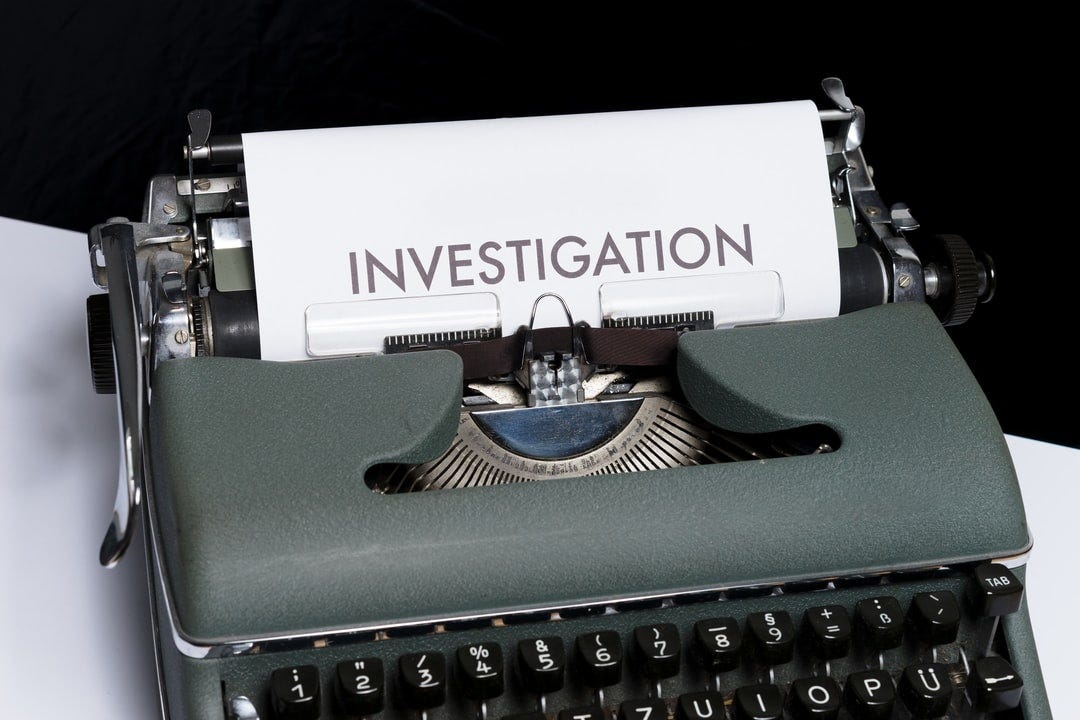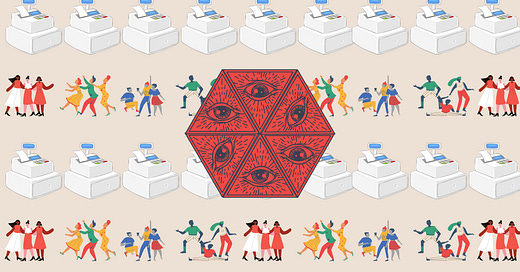Counting Problems
Counting is central to the modern era: from the census to voting preferences to marketing surveys, we are counted and classified as members of one group or the other. These counting methods lead to thin forms of identity. For many years, I was roll number 88193 for the purposes of examinations, grading and class assignment. But that number said nothing about me: I was just a mark on a piece of paper alongside other marks. 88193 was merely a pointer, an abstract address behind which lay a person, but the number by itself didn't paint a picture of me as an individual.
A biography is a very different kind of identity document - it establishes a narrative of my life and enters into my life; it’s purpose is to establish me as an individual. Until recently, we didn’t have the capacity to biograph at scale - only the rich, powerful and the famous has the luxury of having their stories told to the world. The big data world has changed that situation dramatically - we can now tell everyone’s stories but:
Why should you care?
Trick question, for the answer is: you already care. You don’t want your identity stolen by hackers on the dark web (newsflash - it’s already been stolen and is being sold for pennies) and you don’t want your identity packaged and sold legally for ad revenue either (newsflash - that’s happening too).
But fights over digital identity are only one of many such fights. Identity and related notions like person-hood are central to other struggles as well.
When a concept finds itself embroiled in struggles over rivers, animal rights, indigenous cosmologies, data privacy, surveillance capitalism and climate change, you know that it’s pressing upon something fundamental to our times. All the more important not to treat identities as narrow technical and legal topics, to be solved piecemeal using blockchains or supreme court judgments.
Of course, I am not saying that lawyers arguing on behalf of rivers should also brush up on their knowledge of XR; there’s obviously an important role for precisely stated technical concerns. But at the same time, we should also resist the temptation to cleave off portions of this explosion of identitarian struggles as if they were unrelated problems - that digital identity and the metaverse lives on a different plane from recognizing the rights of rivers and chimpanzees, and while they are both important, they have nothing to do with one another. Some concepts are important precisely because they’re everywhere.
Consider the analogy with machines: airplanes aren’t anything like laptops and learning how to make one doesn’t make you good at making the other, but it’s impossible to understand our contemporary civilization without assimilating both of them to the larger category of ‘machine.’
Like machines, identities aren’t an incoherent mess - we can discern patterns if we look carefully. The two movements of identity - one fragmenting and unifying human identity across digital and physical spaces and the other fragmenting and unifying human identity across species, places and ecologies are two folds of the same movement. But we shouldn’t expect theroretical unity, for identity in both its digital and riverine avatars is a network of overlapping intuitions that doesn’t have to cohere into a single account.
Three Marks of Identity

Every one of us has a firm grasp of the following fact: there’s a you that’s always been you and no one else; further, you have unique access to that you from the inside. Remember that time when you were bullied on the playground and beaten up for no reason whatsoever (or were you the bully?): you can access the feeling of shame and powerlessness in the first person while everyone else has to do with visual or verbal testimony.
Here’s a thought experiment: let’s say science has advanced so that every single molecule that leaves your body can be gathered and (eventually) assembled into another human being. Now imagine that you were assigned assembly machine # 34872 that went to work from the day you were born, collecting all the molecules leaving your body. Finally on December 18, 2037, the day you turned forty five, 34872 has collected enough of your molecular entrails to re-assemble you as a five year old child, i.e., every single molecule that was in your body when you were five years old or younger is in this new reassembled human being.
Now go back to your first vivid memory from the time you were three - let's say it was the first time a dog licked your face, or the first time you licked an ice-cream cone. Or the dreaded bully beating you into the ground. Do you remember it from the inside? Of course you do.
Yet, every molecule in your body from that time - including every cell on your face and every cell in your tongue - is in 34872's handiwork. But it's you who possesses the memory, not the five year old.
How come?
Somehow your thoughts, your feelings and your experiences are uniquely attached to you even as you age. Some cultures might even believe those unique experiences continue past your death and into your next incarnation.
So who is that you? How is that person demarcated from others?
Here are three different aspects of personal identity that matter to our investigation:
Addresses: these are 'places' that are strongly identified with you: physical as well as abstract locations. Passports are abstract addresses, for they can stand for you. Technologically, addresses are well known identity markers: we have issuing addresses in the form of identity cards and other artifacts for a very long time. Addresses are thin and arbitrary - neither your signature nor your passport has any resemblance to you.
Traces: these are modes of behavior and signs of your passage from which I can infer you were there. The scan of your passport in an immigration desk signals that you were in so and so nation at that time. My dog is very good at identifying me based on my traces - to her, the way my feet drag on the floor while walking are a tell-tale sign of my existence. The large tech companies are primarily in the business of inferring people from their traces.
Haecceity. This is probably a new term for you. From the Stanford Encylopedia of Philosophy: “The haecceity of an individual a is the property of being that very individual, the property being a.”
Addresses are very common: all of us have several and it’s possible now to have cryptographically secure addresses that belong to us and us alone. Traces are getting better and better - the exhaust of our lives pinpoints who we are quite well and big data platforms are getting quite good at collecting that exhaust. What about haecceity: can technology ever solve the problem of identifying the ‘me in the me’?
What is this haecceity that helps identify us and us alone?
One extreme: my haecceity is so unique to me that it can never be subsumed under any formal system. I hinted at this possibility at the beginning of this essay, when I said that you have unique access to your life. Even if we are both looking at the same thing and from the same spot, my experience is unique to me while yours is unique to you; there’s always the theoretical possibility that what I see as red you see as blue. If so, there’s no system which counts my haecceity. It’s a serious possibility.
At the other end of the spectrum: our haecceity is nothing more than a bundle of our addresses and traces, i.e., clustering our identity cards and purchasing patterns is more than enough to point at us and say: this is you and nothing but you. A machine learning system trained on my data exhaust and having access to my addresses might be capable of acting on my behalf in many circumstances.
Am I free to talk at 9:00 AM on Monday? My mechanical surrogate should be able to tell you. Do I want to talk to you at 9:00 AM on Monday - my mechanical surrogate might be able to compare patterns with your mechanical surrogate to decide whether we are good matches or not.
But as the old saying goes: you can bring the horse to the water but you can’t make him drink. There are things that only we can do together, not our surrogates - and I don’t mean just that thing you pervert. Then again, I can't rule out the possibility that my digital avatar will go out for a drink with your digital avatar in a digital bar and come back the next morning to report on how it went while both of us catch a good night’s sleep. Win win. So where does surrogacy end and the uniquely real begin?
And more importantly, why should we care? Why does it matter that my haecceity is hard to grasp?
Like this essay? Share it ↗️ ↗️
Incidentally, today being the day that Buzzfeed is going public as a SPAC, here’s a (semi) anti-capitalist screed by its founder, Jonah Perretti. He went from quoting Deleuze to popping listicles in the space of a decade. Betrayal of the revolution? Massive improvement? You be the judge.
The Registry
A concept world might help: I call it “The Registry.” Imagine a digital archive in which all of our lives are chronicled automatically. You don’t have to do anything: eat a sandwich and it adds a row to your data table; take a walk to the bazaar and it adds another row. For the first time in human history, the historical record will be updated alongside the event themselves. Like the Borges story about exactitude in science, but a timestamped record rather than a map.
ls creepy doesn’t it? But Google and Facebook are already creating their own registers and Xinping is creating a more comprehensive version for his subjects. Even with all that technology, the registry will struggle with a fundamental question:
What should it record?
When I stumble into the bathroom to brush my teeth and take a shower, should that be counted as one event (‘morning routine’) or as two? If the first, then what about the coffee I make after I finish showering? Does it get added to the list? Where does the list stop? If the latter, then what about each stroke of the toothbrush? Why aren’t they discrete events? Like with the counting of rivers as persons, the act of counting is increasingly easy, but the real challenge is in knowing what to count or whether to count it.
Who isn’t struggling to assemble their lives out of individual actions and connecting with others in contextually relevant ways? Identity is a major social, technological, psychological and metaphysical challenge precisely because it’s being pressed on all sides. Hypothesis time:
In our Humpty Dumpty era, we are trying and constantly failing at putting ourselves together and most of us can’t do it unaided; we need a technology like the Registry to see ourselves.
Still don’t believe it? Let's go back to the (more) traditional ways of representing haecceity: the biography and of course, the novel. These were the technologies of sharing the experiences of unique individuals; I learn about the mind of a murderer through the eyes of Raskolnikov.
'standard' novel doesn't make the system around the individual explicit - except in novels of ideas such as the Brave New World or 1984 - for that we have to explore the two literary genres that emerged in the era of the 'system': science fiction and whodunits. While conceiving a new or better system, we have at least two modes of imagination:
Futuring: imagining a world in a better/dystopian future helps think through what it might take to get to the top of the hill or avoid that dismal fate. Futuring is the domain of science fiction.
Solving: imagining a world in which a problem has to be solved for the system to return to normal helps us understand how the system works and how it maintains order. Solving is the domain of the whodunit or the detective story.
Like many readers, I have been hooked by both genres since childhood.
VW & Co
I haven’t read H.G. Wells in a zillion years but there was a time in my childhood when books by him and Jules Verne were my constant companions. They were the only science fiction writers known to my parent’s generation and I could find their books in home libraries. And then I became a teenager and discovered mid century Science Fiction (Asimov, Clarke etc) and never looked back at VW & Co; galaxies being better than planets and everything.
V & W were the inventors of SF, weren’t they, with all the romanticism and imperialism about scientific and technical progress that comes with the genre. It’s worth going back to the War of the Worlds or 20,000 Leagues Under the Sea and read them as documents both of the past and the future.
And the future as a category was invented by people like them, both as a horizon and as a concrete path of progress. But as I said a couple of weeks ago, the future is a tired category. Science Fiction is dead and truth be told, Science is dead too. Not because vaccines don’t work or there’s some massive conspiracy to fake the moon landing, but because the romantic dream is tapped out. While every scientist talks about simplicity and Occam’s razor, the fact remains that science is as much a cyborg enterprise as any other major function within the global economic system. Which makes some of us look back fondly to the ghosts of experiments past.
I mean what more can one want besides figuring out the shape of the universe 10^-34 seconds after it was born? It’s possible to be very smart and very driven while doing science, but it’s no longer possible to be foolish. Which spoils the romance if you ask me. Science is for butterflies, not for moths (in the language of this piece that I chanced upon while taking a break from writing this paragraph).
So what’s left for the stupid fools among us? Where can go build castles in the air? Where else but the graveyard of charlatans and lovers: philosophy, if we are willing to expand that ancient discipline to include fiction, for science fiction is often philosophy in fictional form. But how do we make the individual important in a story that spans galaxies? Kind of hard to do unless we borrow some techniques from that other philosophical genre: the detective story.

There’s a simplicity to the detective story: someone’s committed a crime, causing a rupture in the moral universe and it’s up to the detective to repair the fabric of justice. If science fiction painted a future in which we fly the heavens, the detective story used reason and evidence to bend the arc of the universe towards justice. It is also science fiction!
But what happens when the crime is monstrous and defies heroic action? Or when the powers themselves are responsible for the crime? Like in the Holocaust: how can any amount of patient detective work and legal action repair the harm? The real detective work in the post-WWII era was done by the US and the Soviet Union, first by defeating the Nazis and then establishing post-war regimes predicated on progress and the use of science and technology to amass wealth and power. That post-war narrative of state driven progress explains the power of the police procedural, the dominant detective form on TV, which shows how the organs of the state are fundamentally ‘right.’ My favorite show growing up was the (then) West German show, ‘Der Alte’ - the Old Fox as it was called in English,’ which has been running continuously for 45 years!
That too is failing. The detective story works as long as the crimes are against people and the state is fundamentally 'good,' so that its functionaries are legitimate agents of justice. But what happens when the crime isn't even recognized as one? How is it possible to spew trillions of tons of carbon into the atmosphere and not see it as a crime? Who will be the detective who apprehends the criminal in this case?
We need need a new genre that marries the world of science fiction, and the world of the whodunit: for we are simultaneously living in the future and needing to solve the crimes of the present. I am not saying it's impossible (artistically as well as politically) - just as how the gentleman detective (Sherlock Holmes, Ms. Marple, Father Brown) was replaced by the professional detective (Law & Order) backed by the power and rationality of the state, we need a new detective to ferret out crimes that can't be prevented by the state (or are abetted by the state) such as crimes against rivers and dolphins. Before we can ask 'who will solve those crimes?' we have to be ready to accept they are crimes in the first place.
That's the challenge of identity: until recently, we had a fixed category, 'the human' and it was a matter of building the right system to help that category flourish. But now, that category itself is under intense scrutiny: robots, rivers, metaverses and manatees are all knocking on the doors of the human castle, waiting to be let in.
Provisional Conclusion: Haecceity still remains a puzzle, needing new artistic forms, new technological systems and new political imaginations. I will delve into all three in the next essay.

Afterword: Knowing and Making
Is philosophy more like science or more like engineering?
Why is that even a question? How many books do you see on the philosophy of bridges, compared with the shelves filled with the philosophy of truth or quantum mechanics? Until recently, philosophers were indistinguishable from scientists and even today, it’s a rare senior scientist who doesn’t desire to ascend the ladder of philosophical abstraction. The historical connections with science are much much deeper.
But the actual practice of philosophy suggests the situation is more complicated than it appears. While scientists conduct experiments or solve equations and only report the outcome of their investigations in writing, philosophers write for a living - they are no different from novelists in that regard. And outside certain types of analytic philosophy, philosophers are read for both style and content, making them literary artists of a sort. So, let me ask a variation of the original question:
Is a novelist more like a scientist or like an engineer?
Seems pretty clear once again: novelists, like engineers, make things up; they don’t discover pre-existing facts, whatever the greater truth of literature might be.
AI and XR are making philosophy and engineering come closer together: we can test philosophical ideas in the wild, not by conducting experiments but by making robots and worlds. It’s in that spirit that I am approaching the question of identity in the Interverse: as a deeply philosophical topic that will be fleshed out through the making of things.
So two final points:
Making replaces knowing as the primary philosophical activity
We won't discover the 'truth' about identity via this method. Instead, we will embody it in artifacts.






